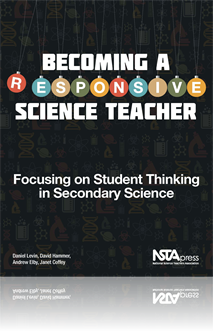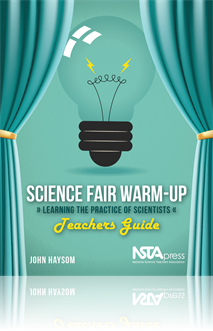All Resources
Book Chapter
Spontaneous Generation (Cell Theory)
The purpose of this activity, in this chapter, is to help students understand that all life on Earth arises only through the reproduction of preexisting life and not from nonliving materials. This “life from life” principle is called biogenesis....
Book Chapter
Movement of Molecules In or Out of Cells (Osmosis and Diffusion)
The purpose of this activity is to help students understand the process of osmosis and to understand how a cell membrane acts as a selective barrier. This activity also helps students learn how to engage in practices such as using planning and carryi...
Book Chapter
Liver And Hydrogen Peroxide (Chemical Reactions and Catalysts)
The purpose of this activity is to help students understand that most cell functions involve chemical reactions and many reactions (including decomposition and synthesis) are made possible by enzymes. This activity also helps students learn how to en...
Book Chapter
Cell Size And Diffusion (Diffusion)
The purpose of this activity is to help students understand passive transport in cells (i.e., diffusion and osmosis) and how the size of a cell can impact the time it takes for important molecules to diffuse through a cell. This activity also helps s...
Book Chapter
Environmental Influence on Genotypes and Phenotypes (Genetics)
The purpose of this activity is to help students understand Mendelian genetics and how the environment can influence the phenotypes of organisms. This activity also helps students learn how to engage in practices such as using mathematics and computa...
Book Chapter
Hominid Evolution (Macroevolution)
The purpose of the activity, in this chapter, is to help students understand hominid evolution and to recognize the challenges of identifying evolutionary relationships between hominid species using fossils. This activity also helps students learn ho...
Book Chapter
Plants and Energy (Respiration and Photosynthesis)
The purpose of this activity is to help students understand how plants use photosynthesis to convert carbon dioxide into sugar and then use cellular respiration to convert the sugar into a useable form of energy. This activity also helps students lea...
Book Chapter
Healthy Diet And Weight (Human Health)
The purpose of this activity is to help students understand the relationship between diet, exercise, weight, and body mass index. This activity also helps students learn how to engage in scientific practices such as using planning and carrying out in...
Book Chapter
Color Variation In Venezuelan Guppies (Mechanisms of Evolution)
The purpose of the activity, in this chapter, is to help students understand how natural selection, sexual selection, and the interplay between these two mechanisms can shape the traits of a population found in different habitats over time. This acti...
Book Chapter
Termite Trails (Animal Behavior)
The purpose of this activity is to help students understand that some organisms, such as termites, have instinctive inherited behaviors. These inherited instinctive behaviors, which evolved over time through the process of natural selection, had a po...
Book Chapter
Misconception About Theories and Laws (Nature of Science)
The purpose of the activity, in this chapter, is to help students understand that theories do not become laws in science and that there is no hierarchal relationship between these two types of scientific knowledge. This activity is also designed to a...
Book Chapter
Misconception About the Nature of Scientific Knowledge (Nature of Science)
Many people believe that scientific knowledge is absolute. They think of it as something that has been proven true and as a result, it cannot or will not change. The purpose of this activity is to help students understand that scientific knowledge is...
Book Chapter
Misconception About the Work of Scientists (Nature of Science)
Many people think that the work of scientists is procedural in nature. They think that scientists use the same techniques to collect or analyze data or follow the same routine for all investigations. The purpose of the activity, in this chapter, is t...
Book Chapter
Misconception About the Methods of Scientific Investigations (Nature of Science)
The purpose of this activity is to help students understand that scientists plan and carry out many different types of scientific investigations, and as a result, there is not one single scientific method that all scientists must follow. This activit...
Book Chapter
Misconception About Life On Earth (Evolution)
The purpose of this activity is to help students understand biological evolution and the mechanisms that drive it. This activity is also designed to address many of the Common Core State Standards for English Language Arts and Literacy, which have a ...
Book Chapter
Misconception About Bacteria (Microbiology)
The purpose of this activity is to help students learn about the wide diversity of bacteria found on Earth and some of the roles bacteria play in biological systems. This activity is also designed to address many of the Common Core State Standards fo...
Book Chapter
Misconception About Interactions That Take Place Between Organisms (Ecology)
The purpose of this activity is to help students understand some of the different types of interactions that can, and do, take place between organisms within an ecosystem. This activity is also designed to address many of the Common Core State Standa...
Book Chapter
Misconception About Plant Reproduction (Botany)
The purpose of this activity is to help students understand plant reproduction and the difference between sexual and asexual forms of reproduction. This activity is also designed to address many of the Common Core State Standards for English Language...
Book Chapter
Misconception About Inheritance of Traits (Genetics)
The purpose of this activity is to help students understand that acquired traits, such as injuries and specific skills, are not passed down from parent to offspring. This activity is also designed to address many of the Common Core State Standards fo...
Book Chapter
Desert Snakes (Mechanics Of Evolution)
In this chapter, the purpose of the activity is to help students understand how natural selection can shape the traits of a population found in different habitats over time and how aposematic coloration (i.e., the bright colors of bad tasting or veno...
Book Chapter
Misconception About Insects (Ecology)
The purpose of this activity is to help students learn about the important role that insects play in ecosystems and the specific role that termites, which are often viewed as a nuisance, play in specific ecosystem. It is specifically meant to help st...
Book Chapter
The purpose of the activity, in this chapter, is to help students understand Mendelian genetics (including the law of segregation and the law of independent assortment) and several different patterns of inheritance (such as dominant-recessive, co- do...
Book Chapter
DNA Family Relationship Analysis (Genetics)
The purpose of the activity, in this chapter, is to help students understand the molecular basis of heredity and the role that DNA technology can play in solving social problems. This activity also helps students learn how to engage in practices such...
Book Chapter
Evolutionary Relationships in Mammals (Genetics and Evolution)
The purpose of this chapter is to help students understand how modern phylogenetic systematics (i.e., the classification based on evolutionary history) is based on cladistics analysis. This activity also gives students an opportunity to create a clad...
Book Chapter
Decline in Saltwater Fish Populations (Ecology and Human Impact on the Environment)
The purpose of this chapter is to help students understand the factors influencing the survival of organisms in an environment, focusing on the interdependent relationships in an ecosystem. It calls attention to the limitations of our resources and t...
Book Chapter
History Of Life On Earth (Trends In Evolution)
The purpose of this activity is to help students understand the diversification and extinction of species within families during the history of life on Earth. This activity also helps students learn how to engage in practices such as using mathematic...
Book Chapter
Surviving Winter in the Dust Bowl (Food Chains and Trophic Levels)
The purpose of this activity is to help students understand food chains, the interactions between trophic levels, the interdependency of organisms, and how energy flows through a system. This activity also helps students learn how to engage in practi...
Book Chapter
Assessments and Student Samples
This Assessment chapter is meant to help teachers identify the components of an argument in students’ work and how to use the rubric to provide feedback and grading. Student samples are provided and identified as high, medium, and low based on qual...
Book Chapter
The Need for Responsive Teaching
"Responsive teaching" means something that goes beyond the images of teachers presenting information or crafting experiences, to teachers really focusing attention on student thinking. It is closely connected to assessment, not just in the sense of e...
Book Chapter
The Refinement of Everyday Thinking
This chapter is in two parts and has two interwoven purposes. The first part focuses on everyday thinking, dividing discussion into sections—“Everyday Knowledge” and “Everyday Reasoning.” The purpose here is to talk more about science and s...
Book Chapter
This chapter provides a brief overview of the set of cases and provides four suggestions—temper the impulse to evaluate the teacher; focus on understanding the students’ thinking as inquiry; support interpretations with specific evidence from the...
Book Chapter
This chapter presents the first in a pair of cases about classes on the same topic—a question developed by Izzy Kovach, one of the more experienced teachers. She found an article about a "novel commensalism" wherein live, blind snakes live unharmed...
Book Chapter
This book of case studies came from the final year of a three-year research collaboration among a team of teachers and project staff entitled What Influences Teachers’ Modifications of Curriculum? (National Science Foundation ESI 0455711). The cas...
Book Chapter
The Rime of the Ancient Mariner
This case study documents what happened in Jenny Tamper's 10th-grade biology class when she showed her students a stanza from Samuel Taylor Coleridge's poem "The Rime of the Ancient Mariner," and asked them to explain what they thought it was describ...
Book Chapter
Ninth grade students at two different schools worked on the same conceptual questions about freely falling objects. This chapter presents the first of two case studies about what happened. In this case study, Matt Reese analyzes his students' written...
Book Chapter
This case study describes what happened in David Hovan's ninth grade "Conceptual Physics" class when he asked students to answer the conceptual question set introduced in the previous chapter. He then brought the class together to discuss their respo...
Book Chapter
This book provides materials to support practices of learning to attend to student thinking, in classroom discussions and in student work. It serves to highlight some of the things to recognize in students’ thinking, both in terms of progress towar...
Book Chapter
Variables And Their Controls: Isolating Variables: Reducing Complexity
Determining the best hull design is a challenging problem. Scientists proceed systematically about designing a hull that minimizes water resistance. Drawing on their experience, they would probably begin by trying to make a list of all the factors (v...
Book Chapter
This chapter presents 15 Starting Points—some address physics, some chemistry, and others biology, while some have an engineering flavor. All students, regardless of whether or not they have previously experienced a science fair, are invited to cho...
Book Chapter
An Overview of the Nature of Scientific Inquiry
There are many possible answers to the question, "What is the nature of science and scientific inquiry?" This chapter provides students with experiences through which they can understand what science is all about and the sort of demands a scientific ...






